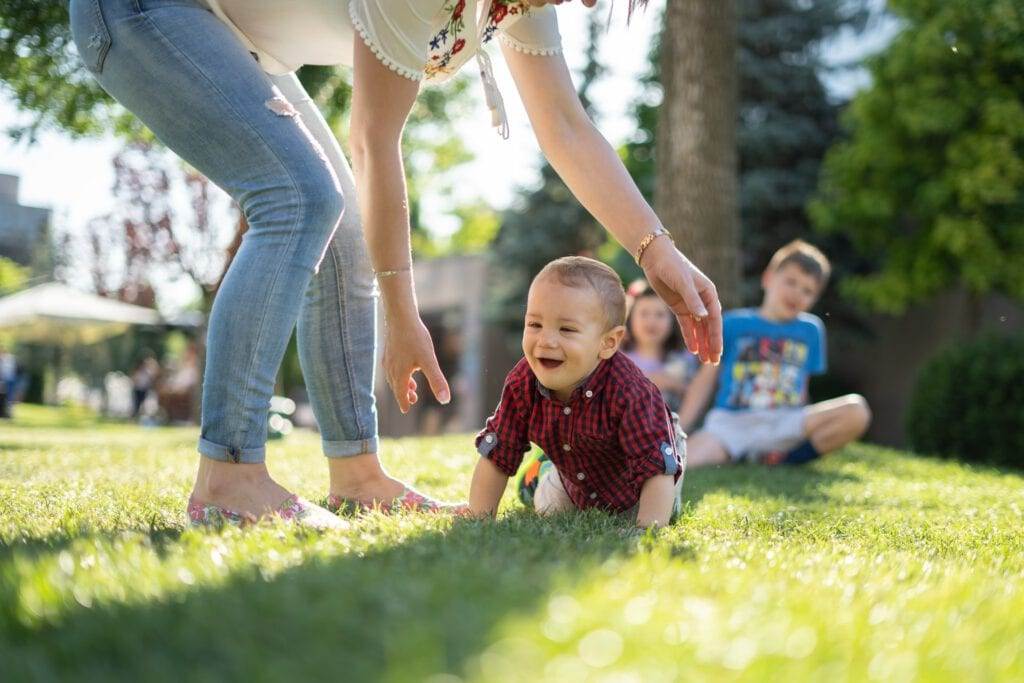Since corona hit our shores, I became painfully aware of our small expatriate family’s isolation, without extended family or life-long friends to physically rely on. The reality check was that no matter how solid our family is, life can unexpectedly pile stress onto any family, testing relationships and mental well-being.
While there was something special about our tiny family bubble and more quality time spent with my little boy, balancing homeworking, homeschooling, and social isolation overwhelmed me at times.
Genuine, neighbourly support could alleviate this pressure, which is why I found the idea of Buurtgezinnen so appealing.
What is Buurtgezinnen?
Buurtgezinnen is a social, community initiative in the Netherlands based on the idea that it takes a village to raise a child. Their motto, “opvoeden doen we samen,” translates into “we educate together.”
Families who feel overwhelmed for whatever reason are matched and supported by another neighbourhood family who has the current means to do so. It can be likened to respite care, where children receive extra attention and parents get a break, but it is organised on a community basis, outside of the formal social service care system.
With the guidance of the local Buurtgezinnen coordinator, the two families agree on what this support will look like and how often.
Who started it and why?
Leontine Bibo, the founder of Buurtgezinnen, believes that this social initiative, community support raising their children together, can often deescalate a stressed family situation, preventing it from worsening and even imploding.

According to Leontine, Buurtgezinnen can contribute to children growing up safely and happily in their own homes without being moved into foster care. Leontine is an experienced crisis foster care parent, mother, grandmother, and entrepreneur. She has a passion for the well-being of children growing up within their own family.
Benefits of this initiative
An internal research study (2018) showed remarkable positive effects for both parents and children.
Top six benefits for children
- an expansion of their own world and development
- feeling happier
- more social contact
- increased confidence
- better school achievement
- a decrease in behavioural problems
Top six benefits for parents
- respite and less parental stress
- an extended local network
- a more positive outlook
- increased confidence
- an extension and development of their own parenting skills
- community participation
An external study done in 2020 supported many of these findings and highlighted the benefits also gained by the support family. This study suggested that there could be an even stronger focus on primary prevention, helping families with less severe problems who feel overwhelmed and socially isolated.
Where can you take part?
Many municipalities welcome Buurtgezinnen, viewing it as a preventative initiative. Currently, they work closely with more than 80 local municipalities across the Netherlands.
Unfortunately, a family can only access their services if they are registered with and live in a municipality endorsing Buurtgezinnen.
Who can take part?
Both support families and request families have diverse backgrounds, with varying skills and different issues. Buurtgezinnen requires all participating families to be open and honest with their matched family, collaborate closely with the Buurtgezinnen coordinator, and adhere to the house rules and family agreements.
Vraaggezinnen (Request Families)
Families requesting support can be any family, with children of any age, feeling overwhelmed by their daily parental stress and struggles; the severity and the issues differ from one family to the next. This family may have no network of neighbours, extended family, or friends whom they can turn to in time of need, which can often be the case when you’re an international family.
Real-life examples of families supported through this initiative range from single-parent families to families with teenagers, families with children who have health or behaviour challenges, and refugee families.
Sometimes more professional help is needed as the issues are too severe for another family’s support. The Buurtgezinnen coordinator will assess each situation, but examples, where this initiative may not be the best choice, are:
- serious addiction or psychiatric challenges
- an unsafe situation requiring child protection measures
- severe intellectual disability of either child or parents
- too significant a language barrier preventing any communication
- when embittered divorce procedures and custody battles are active
Steungezinnen (Support Families)
The types of support families are diverse. It could be a family with children, grandparents, or adults without children. However, the support family must have experience raising children — and enough time to offer. This timeframe is agreed upon between the two families, but it ranges from a half to one day per week.

The safety of the children is paramount, and the support family needs to show a VOG (Certificate of Good Behaviour). The Ministry of Security and Justice issues a VOG for a person who has no criminal convictions or issues with the law.
In an interview, founder Leontine said that there are no ideal families. Still, it is expected that a support family loves and respects children, genuinely wants to support a neighbour, and does not judge another parent’s values, approach, decisions, or behaviour.
There is an online competency test to see if you are suitable.
A Step-by-Step Process
There are a number of steps involved in becoming a participant of Buurtgezinnen:
- Register via the website as a support or a request family.
- The local Buurtgezinnen coordinator meets with the request family to discuss what support they need.
- Together, they write up a support profile.
- The coordinator then searches for a suitable local support family.
- The coordinator matches two families in the same municipality.
- The coordinator guides the two families during a meeting to agree on the time, support, and house rules.
- There will be a trial period.
- After six months, the coordinator, in collaboration with both families, reviews this relationship to see if it is a good match and if the agreement is working for all.
So, if you are keen on becoming a support family or need a bit of extra help for the well-being of your family, why not participate in the Buurtgezinnen community? A bit of community spirit and kindness may help us all along the way in these extraordinary times.
Had you heard of this initiative before? Tell us your thoughts in the comments below!
Feature Image: Tyler Nix/Unsplash
